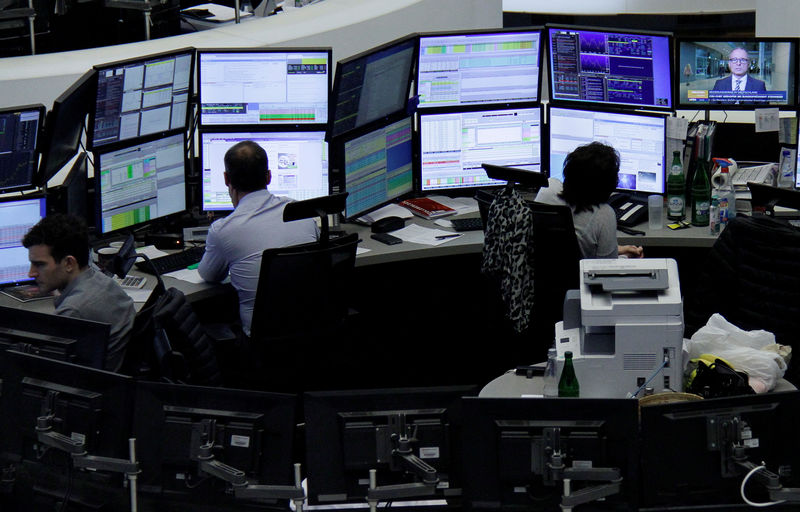By Tom Wilson
LONDON (Reuters) - World stocks slipped on Wednesday as a deepening inversion of the U.S. bond yield curve a day earlier reignited worries over the possibility of recession, sending investors towards perceived safe-haven assets from the Japanese yen to gold.
The U.S. yield curve inverted on Tuesday to levels not seen since 2007, stoking a sell-off on Wall Street. An inversion of the yield curve - where yields on shorter-dated debt are above those on longer-dated paper - has historically been a highly accurate predictor of a U.S. recession.
MSCI's world equity index (MIWD00000PUS), which tracks shares in 47 countries, fell 0.1%, dragged down by European shares. The broad Euro STOXX 600 (STOXX) fell 0.6%, with bourses in Paris (FCHI) and Frankfurt (GDAXI) tumbling 0.6% and 0.7% respectively.
However, UK stocks bucked the trend (FTSE), turning positive to gain 0.3% as sterling dived 1% on Prime Minister Boris Johnson's move to restrict parliamentary time before Britain's planned departure from the European Union.
Johnson will limit parliament's ability to derail his Brexit plans by unveiling his new legislative agenda on Oct. 14, a government source told Reuters, stoking fears of an economically disruptive no-deal departure from the EU.
The pound, already trading lower on the day, was last down 0.6% at $1.2210.
Still, Wall Street futures gauges
"It's become very difficult for investors to garner an idea of where we go to next," said Michael Hewson, chief market strategist at CMC Markets. "The weakness in bond yields and the strength in havens speaks to an investor that is becoming increasingly risk-averse."
The 10-year Treasury yield (US10YT=RR) had fallen on Tuesday to around 6 basis points below the two-year yield (US2YT=RR), with the 10-year yield close to three-year low touched on Monday.
Longer-dated bond yields also fell. The U.S. 30-year Treasury yield (US30YT=RR) slumped to a record low of 1.906%, and was last down 6 basis points on the day.
Some investors said market fears of a looming recession, would further support expectations that the U.S. Federal Reserve would cut interest rates further - something they warned is not a foregone conclusion.
Federal funds futures
"The market is pricing another 100 basis points cut from the Fed by next year, but the Fed seems rather reticent to follow where the market is indicating it should go," said Peter Schaffrik, head of European rates strategy at RBC Capital Markets.
(Graphic: GBP moves link: https://fingfx.thomsonreuters.com/gfx/mkt/12/5310/5267/GBP%20%20moves.jpg)
The renewed fears of a global economic slowdown bolstered demand for assets perceived as safe havens.
Gold
In currencies, the Japanese yen kept a grip on its recent gains. The yen, seen as a safe haven in part because of Japan's large trade surplus and a tendency for domestic investors to repatriate money in times of market turbulence, traded at 105.78 per dollar
The dollar index, which measures the greenback against a basket of currencies, gained 0.1% to 98.094 (DXY). Currencies that tend to perform well when investors buy into riskier assets, such as the Australian

Graphic: U.S. Yield Curve link: http://fingfx.thomsonreuters.com/gfx/mkt/4/168/168/U.S.%20Yield%20Curve%20Inversion.png)